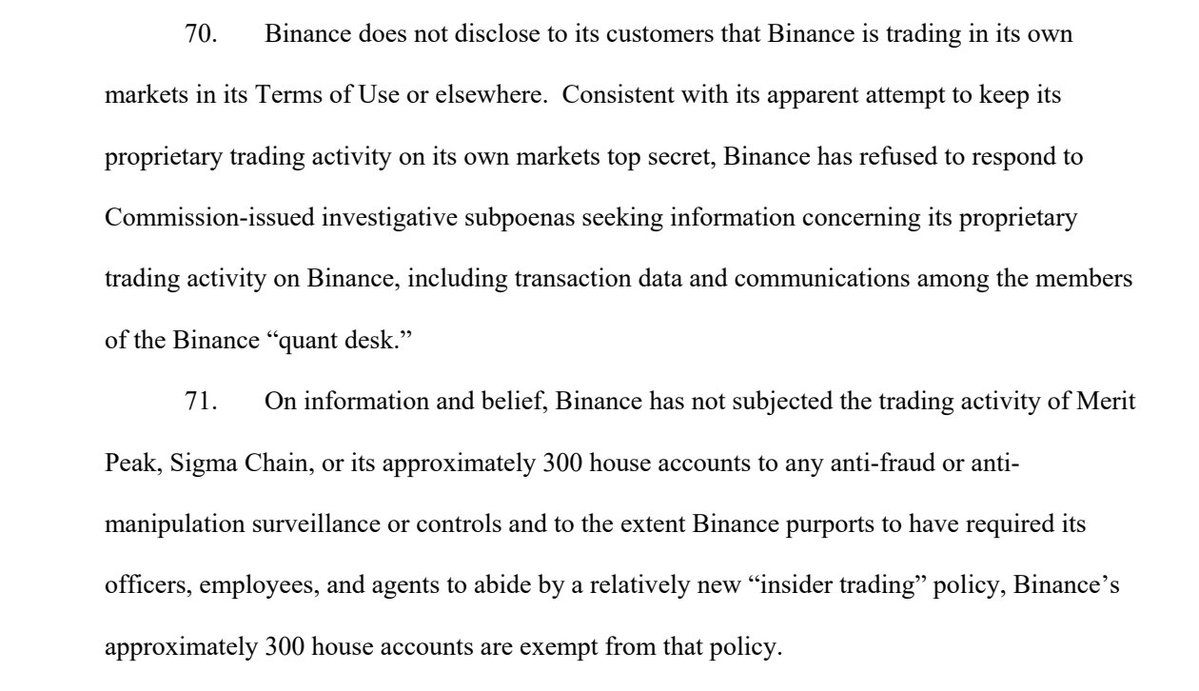The CFTC's lawsuit against Binance and Changpeng Zhao may result in hefty fines. How does the industry view this?
Original Title: "US CFTC Lists Several Charges Against Binance and Zhao Changpeng, May Impose Huge Fines, How the Industry Views It"
Author: Mary Liu, BitpushNews
On March 27, the U.S. Commodity Futures Trading Commission (CFTC) announced it was suing the world's largest cryptocurrency exchange Binance and its CEO and founder Zhao Changpeng (CZ), claiming that they deliberately evaded federal laws and operated an "illegal" digital asset derivatives exchange. In addition to suing CZ and several Binance-affiliated companies, the CFTC also accused Binance's former Chief Compliance Officer Samuel Lim of assisting and encouraging Binance's violations.
The CFTC is a civil government agency, so it cannot bring criminal charges against companies or seek imprisonment for individuals. However, the agency's case could lead to significant fines and other penalties for both the company and individuals. The CFTC stated: "In the ongoing litigation against the defendants, the agency seeks the forfeiture of illegal proceeds, civil penalties, permanent trading and registration bans, as well as permanent injunctions against further violations of the Commodity Exchange Act (CEA) and CFTC regulations."
According to a previous report by The Wall Street Journal, the CFTC and other federal agencies, including the Department of Justice, have been investigating Binance for years, and this lawsuit is the latest regulatory blow to the crypto industry in the past year. Adam Cochran, a partner at Cinneamhain Ventures, commented on Twitter that the CFTC is trying to deliver a "fatal blow" to Binance, writing: "First reaction… I think they are likely to succeed in overturning the Binance empire with this move."
The two major cryptocurrencies, Bitcoin and Ethereum, quickly fell after the news broke, with Bitcoin dropping 3.3% to $26,800 within an hour, and Ethereum falling 2.9% to below $1,700.
Zhao Changpeng (CZ) responded to the lawsuit announcement with a tweet of "4," alluding to a tweet he made in January calling on the community to "ignore FUD, fake news, attacks, etc."
What Did Binance Do Wrong? Operating Illegally in the U.S.
The CFTC claims that Binance has been operating a digital asset derivatives trading facility in the U.S. since at least July 2019, allowing U.S. residents to trade futures, swaps, and options on cryptocurrencies such as Bitcoin, Ethereum, and Litecoin. The lawsuit alleges that Binance also attempted to expand its footprint in the U.S., despite the exchange claiming it would block U.S. residents from accessing its platform.
The CFTC stated: "Despite publicly expressing its intent to 'block' or 'restrict' access to its platform for customers located in the U.S., Binance has taken a calculated, phased approach to increase its influence in the U.S."

The CFTC pointed out that in May 2021, Binance's monthly revenue from derivatives trading reached $1.14 billion, up from $63 million in August 2020. Approximately 16% of Binance accounts were held by U.S. customers.
Lax Compliance Controls
The CFTC's lawsuit describes Binance's corporate structure as a "labyrinthine corporate entity" designed to obscure who owns and controls the exchange. CFTC senior enforcement official Gretchen Lowe called Binance's compliance efforts a "sham."

The complaint states that CZ founded Binance in 2017 and traded on its platform through approximately 300 "internal accounts" that he owned directly or indirectly, but the exchange did not disclose this activity in its publicly used terms or elsewhere. The CFTC stated that these internal accounts were not subject to Binance's "insider trading" policies.
According to internal communications reviewed by the CFTC, the lax compliance approach could lead to more severe consequences, such as U.S. and EU-designated terrorist organizations potentially trading on the platform.
The documents referenced multiple chat logs about Binance's use of the Signal messaging app, including conversations between CZ and Binance employees, U.S. customers, and others. The chat logs also mentioned instructions given to employees to use Signal for communications regarding the "U.S. ban."
The lawsuit stated: "Internally, Binance managers, employees, and agents acknowledged that the Binance platform facilitated potential illegal activities… For example, in February 2019, after receiving information about 'HAMAS trading' on Binance, former Chief Compliance Officer Samuel Lim explained to a colleague that terrorists typically send 'small amounts of money' because 'large amounts constitute money laundering.'" For certain Binance customers, including those from Russia, Lim acknowledged in a February 2020 chat: "They come here to commit crimes." Binance's money laundering reporting officer stated, "We see the dark side, but we choose to look the other way."
The regulatory agency stated: "Binance's compliance program has been ineffective, and under Zhao's guidance, Binance has instructed its employees and customers to evade compliance controls to maximize corporate profits."
Failed Anti-Money Laundering Program
The CFTC also claimed that Binance failed to implement an effective anti-money laundering program. The agency stated that it had not established necessary safeguards to verify the true identities of its customers. The complaint alleges that as of at least May 2022, the company had not submitted any suspicious activity reports in the U.S.
The CFTC stated that Binance did not require customers to submit information to verify their identities before trading and "failed to implement basic compliance procedures designed to prevent and detect terrorist financing and money laundering activities."
How Does the Crypto Industry View This Lawsuit?
Some industry participants stated that U.S. regulators are attempting to enforce regulations in the crypto industry without a comprehensive framework.
Meltem Demirors, Chief Strategy Officer at crypto investment firm CoinShares, tweeted that everyone is watching this lawsuit. She noted that this case is similar to the CFTC's case against BitMEX—"with less focus on OFAC violations but more on marketing and product access for U.S. retail business."
Bitpush previously reported that after U.S. regulators accused BitMEX of illegally accepting orders and funds from U.S. customers to trade derivatives on Bitcoin, Ethereum, and Litecoin, the company settled with the CFTC and the Financial Crimes Enforcement Network (FinCEN) for $100 million in August 2021.
Demirors added that the CFTC's latest lawsuit against Binance claims that Bitcoin and Ethereum are commodities, which contradicts the SEC's position. SEC Chairman Gary Gensler has repeatedly stated in interviews over the past year that while he views Bitcoin as a commodity, most other cryptocurrencies are securities.
The CFTC's complaint on Monday also classified Litecoin, stablecoins USDT and BUSD as commodities. Yankun Guo, a partner at the Chicago law firm Ice Miller, stated that this distinction indicates "the lack of clear regulations in the U.S. has created confusion."
Dave Weisberger, CEO and co-founder of the digital asset industry algorithmic trading platform CoinRoutes, believes this case could severely damage the Binance.US platform. Weisberger said: "Binance may soon see its business in the U.S. completely end, as there are many high-quality exchanges operating in the U.S. with liquidity higher than Binance.US."
Jeffrey Blockinger, Chief Legal Officer at decentralized exchange Vertex Protocol, believes that Binance may reach a settlement or file a lawsuit.
Blockinger said: "Any settlement will certainly include Binance agreeing to cease and desist from any further violations related to derivatives sales and violations of the Bank Secrecy Act. If a lawsuit is filed, it may take years to resolve. During this time, Binance will seek to correct any existing deficiencies to avoid any further allegations and demonstrate good faith to the CFTC."
Primitive Ventures CEO @DoveyWan tweeted that if Binance's settlement with the CFTC is $1 billion, that is just one month's revenue for Binance. DoveyWan wrote: "JPMorgan paid the largest CFTC fine in history of $920 million for misconduct and market manipulation, I think Binance can exceed that, $1 billion is a hypothetical number." DoveyWan believes the potential outcomes of this lawsuit include: Binance spending billions to settle with the CFTC; U.S. CEXs continuously spending to refine and cut back on business and products; offshore CEXs thriving in green regulatory zones; DeFi flourishing; non-U.S. founders thriving; more founders joining the anonymous game.
As of the time of publication, the crypto market remained relatively stable, with Bitcoin returning to above $27,000 and Ethereum rebounding to above $1,700.



























